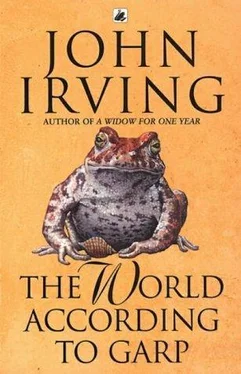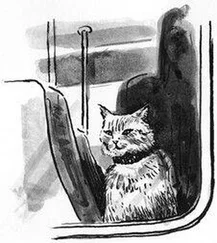Time, Garp knew, would ease everything. Time would also prove him wrong about Alice's writing. She may have had a pretty voice but she couldn't complete anything; she never finished her second novel, not in all the years that the Garps would know the Fletchers—or in all the years after. She could say everything beautifully, but—as Garp remarked to Helen, when he was finally exasperated with Alice—she couldn't get to the end of anything. She couldn't thtop .
Harry, too, would not play his cards wisely or well. The university would deny him tenure—a bitter loss for Helen, because she truly loved having Harrison for a friend. But the student Harry had thrown over for Helen had not been let down so easy; she bitched about her seduction to the English Department—although, of course, it was her jilting that really made her bitch. This raised eyebrows among Harry's colleagues. And, of course, Helen's support of Harrison Fletcher's case for tenure was quietly not taken seriously— her relationship with Harry having also been made clear by the jilted student.
Even Garp's mother, Jenny Fields—with all she stood up for, for women—agreed with Garp that Helen's own tenure at the university, so easily granted her when she was younger than poor Harry, had been a token gesture on the part of the English Department. Someone had probably told them that they needed a woman on the department at the associate professor level, and Helen had come along. Although Helen did not doubt her own qualifications, she knew it hadn't been her quality that had gotten her tenure.
But Helen had not slept with any students; not yet. Harrison Fletcher had, unforgivably, allowed his sex life to be more special to him than his job. He got another job, anyway. And perhaps what remained of the friendship between the Garps and the Fletchers was actually saved by the Fletchers' having to move away. This way, the couples saw each other about twice a year; distance diffused what might have been hard feelings. Alice could speak her flawless prose to Garp in letters. The temptation to touch each other, even to bash their shopping carts together, was removed from them, and they all settled into being the kind of friends many old friends become: that is, they were friends when they heard from each other—or when, occasionally, they got together. And when they were not in touch, they did not think of one another.
Garp threw away his second novel and began a second second novel. Unlike Alice, Garp was a real writer—not because he wrote more beautifully than she wrote but because he knew what every artist should know: as Garp put it. “You only grow by coming to the end of something and by beginning something else.” Even if these so-called endings and beginnings are illusions. Garp did not write faster than anyone else, or more: he simply always worked with the idea of completion in mind.
His second book was swollen, he knew, with the energy he had left over from Alice.
It was a book full of wounding dialogue and sex that left the partners smarting; sex in the book also left the partners guilty, and usually wanting more sex. This paradox was cited by several reviewers who alled the phenomenon, alternately, “brilliant” and “dumb.” One reviewer called the novel “bitterly truthful,” but he hastened to point out that the bitterness doomed the novel to the status of “only a minor classic.” If more of the bitterness had been “refined away,” the reviewer theorized, “a purer truth would have emerged.”
More nonsense was compiled concerning the novel's “thesis.” One reviewer struggled with the idea that the novel seemed to be saying that only sexual relationships could profoundly reveal people to themselves; yet it was during sexual relationships that people appeared to lose what profundity they had. Garp said he never had a thesis and he grumpily told an interviewer that he had written “a serious comedy about marriage, but a sexual farce.” Later he wrote that “human sexuality makes farcical our most serious intentions.”
But no matter what Garp said—or the reviewers, either—the book was not a success. Titled Second Wind of the Cuckold , the novel confused nearly everyone; even its reviews were confusing. It undersold Procrastination by a few thousand copies, and even though John Wolf assured Garp that this was what often happened to second novels, Garp—for the first time in his life—felt he had failed.
John Wolf, who was a good editor, protected Garp from one particular review until he feared Garp would see the review by accident; then Wolf reluctantly sent the clipping, from a West Coast newspaper, with the attached note that he'd heard the reviewer suffered a hormone imbalance. The review remarked, curtly, that it was sordid and pathetic that T. S. Garp, “the talentless son of the famous feminist, Jenny Fields, has written a sexist novel that wallows in sex—and not even instructively.” And so forth.
Growing up with Jenny Fields had not made Garp the sort of person who was easily influenced by other people's opinions of him, but even Helen did not like Second Wind of the Cuckold . And even Alice Fletcher, in all her loving letters, never once mentioned the book's existence.
Second Wind of the Cuckold was about two married couples who have an affair.
“Oh boy,” Helen said, when she first learned what the book was about.
“It's not about us ,” Garp said. “It's not about any of that. It just uses that.”
“And you're always telling me,” Helen said, “that autobiographical fiction is the worst kind.”
“This isn't autobiographical,” Garp said. “You'll see.”
She didn't. Though the novel was not about Helen and Garp and Harry and Alice, it was about four people whose finally unequal and sexually striving relationship is a bust.
Each person in the foursome is physically handicapped. One of the men is blind. The other man has a stutter of such monstrous proportions that his dialogue is infuriatingly difficult to read. Jenny blasted Garp for taking a cheap shot at poor departed Mr. Tinch, but writers, Garp sadly knew, were just observers—good and ruthless imitators of human behavior. Garp had meant no offense to Tinch; he was just using one of Tinch's habits.
“I don't know how you could have done such a thing to Alice,” Helen despaired.
Helen meant the handicaps, especially the women's handicaps. One has muscle spasms in her right arm—her hand is always lashing out, striking wineglasses, flowerpots, children's faces, once nearly emasculating her husband (accidentally) with a pruning hook. Only her lover, the other woman's husband, is able to soothe this terrible, uncontrollable spasm—so that the woman is, for the first time in her life, the possessor of a flawless body, entirely intentional in its movement, truly ruled and contained by herself alone.
The other woman suffers unpredictable, unstoppable flatulence. The farter is married to the stutterer, the blind man is married to the dangerous right arm.
Nobody in the foursome, to Garp's credit, is a writer. ("We should be grateful for small favors?” Helen asked.) One of the couples is childless, and wants to be. The other couple is trying to have a child; this woman conceives, but her elation is tempered by everyone's anxiety concerning the identity of the natural father. Which one was it? The couples watch for tell-tale habits in the newborn child. Will it stutter, fart, lash out, or be blind? (Garp saw this as his ultimate comment—on his mother's behalf—on the subject of genes .)
It is to some degree an optimistic novel, if only because the friendship between the couples finally convinces them to break off their liaison. The childless couple later separates, disillusioned with each other, but not necessarily as a result of the experiment. The couple with the child succeeds as a couple; the child develops without a detectable flaw. The last scene in the novel is the chance meeting of the two women; they pass on an escalator in a department store at Christmas-time, the farter going up, the woman with the dangerous right arm going down. Both are laden with packages. At the moment they pass each other, the woman stricken with uncontrollable flatulence releases a keen, treble fart—the spastic stiff-arms an old man on the escalator in front of her, bowling him down the moving staircase, toppling a sea of people. But it's Christmas. The escalators are jam-packed and noisy; no one is hurt and everything, in season, is forgivable. The two women, moving apart on their mechanical conveyors, seem to serenely acknowledge each other's burdens; they grimly smile at each other.
Читать дальше












